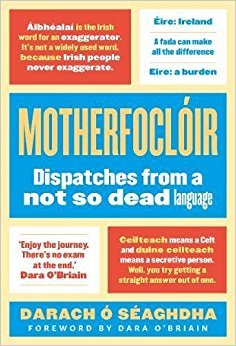|
I picked this up on a whim when I was in Dublin. It was a new, signed release and I had either missed a signing event or signed books had been delivered but I love a more personalized book. They were located prominently in Dubray (a book chain) on Grafton Street and I picked it up to flip through while I had tea and watched people shopping from the upper floor. I was hooked by the introduction and bought it to make the journey back across the pond. Even though I don’t have a tangible connection to Ireland (no grandparents from Cork or Co. Donegal, etc.) I find myself following their politics quite a bit. This is because of Brexit. Brexit is stupid, of course, but Theresa May or whatever Tory figurehead that will replace her (Prime Minister of Great Britain, Northern Ireland and assorted territories) and the Tory party are staying the course. This bit of cretinism affects other countries, most specifically the border between Northern Ireland the Republic of Ireland. You know, the two places that were fighting up until the Good Friday Agreement in 1998/1999. It probably won’t come to anything bad…but there’s a chance the border (which you can easily go across if you have a hankering to visit the whole island) will become a pain in the ass. Watching strange British politicians act like it’s no biggie is strangely warped. Title: Motherfoclóir: Dispatches from a not so dead language Author: Darach ó Séaghdha Page Number: 222, hardback Genre: nonfiction, reference, humor Publisher: Head of Zeus, Ltd. An independent publisher based in the UK. Year: 2017 'Motherfoclóir' [focloir means 'dictionary' and is pronounced like a rather more vulgar English epithet] is a book based on the popular Twitter account @theirishfor. As the title suggests, 'Motherfoclóir' takes an irreverent, pun-friendly and contemporary approach to the Irish language. The translations are expanded on and arranged into broad categories that allow interesting connections to be made, and sprinkled with anecdotes and observations about Irish and Ireland itself, as well as language in general. The author includes stories about his own relationship with Irish, and how it fits in with the most important events in his life. This is a book for all lovers of the quirks of language. This book doesn’t dwell on politics or the troubles. ó Séaghdha’s book (I’m not sure if a capital O with fada is the norm…this is not my kin) deals with the Irish language. The most 'political' this gets is the explanation of Ireland's chosen two languages that their laws are written in. Ireland’s laws and its constitution are written in two languages. First in Irish and then in English. This creates a way to codify any law down to specifics in a way that one language cannot. In fact, many other countries in the European Union do similar things, which is not surprising. I found this fascinating because the United States doesn’t have an official language (although our laws are in English, they can be translated into any language spoken here and still considered legitimate as far as I know). Vignettes of history and culture (mostly Irish) are sprinkled throughout. This was brilliant because I spent some time looking up things I didn't know (Gaeltacht and Aislings) and refreshing my limited knowledge (The Tain). ó Séaghdha also brings moments of his life onto the pages, mostly through his relationship with his dad and growing up in Ireland.
I noted some of my favorite phrases and words because they were new to me and I enjoyed the way they were pronounced:
A fada (ú, í, é, ó) can make the difference:
There is a twitter, @theirishfor and a podcast, titled Motherfocloir and another book, Craic Baby. Other than the new Tana French book, I'm on a financial no-buy to bulk up my savings but his second book has been added to my list. The prose is fast-paced and each page is crammed with information. The overall tone is witty and light. I cannot note enough the absolute care of language that ó Séaghdha gives to each chapter. I really enjoyed the connections, origins and current meanings of the Irish words, which were all new to me. I rated it quite high on goodreads because I enjoyed it so much. It's a tiny bit of a memoir, dictionary and Irish culture/history book all wrapped in one. You're not going to start speaking the language from this book (it's not the purpose) but Duolingo has an Irish language learning section, so that can be helpful. The twitter account gives an idea of how he breaks down words. The other takeaway is that I found the name for my next cat , “púca,” which means mischievous fairy.
0 Comments
Leave a Reply. |
Archives
June 2024
Categories
All
|
